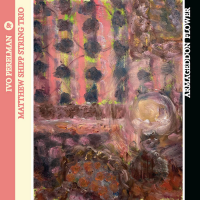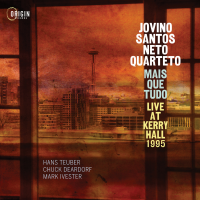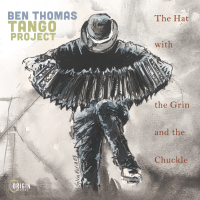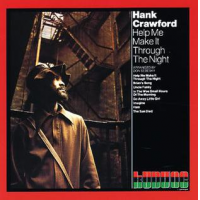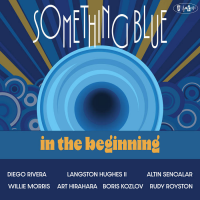Home » Jazz Articles » Liner Notes » Ark Ovrutski: 44/33
Ark Ovrutski: 44/33
With its program of bright melodies, tight ensemble collaboration, individualized solos and firm underlying swing, 44/33—titled for its running time---is an expression of accomplishment and direction from a coterie of players making their marks at the instigation of a well informed and thoroughly engaged leader. Ark Ovrutski was born near Kiev and began playing violin at age 8—but not out of love of classical music. Instead, influenced by his father who admired

Duke Ellington
piano1899 - 1974

Ella Fitzgerald
vocals1917 - 1996

Charles Mingus
bass, acoustic1922 - 1979
Ark as pursued both paths of experience. He attended and graduated with a degree in classical bass from the Russian Academy of Music, where he roomed with trumpeter Alex Sipiagan (who today is frequently featured in the Mingus Big Band) and soon came to play with Russian tenor saxophonist and festival producer Igor Butman. Ark visited the U.S. for the first time in the early '90s, then got a job as house band mainstay and artistic director for a jazz club in Krakow, Poland, where he remained for three years. He "travelled like crazy" all through Europe, enjoying extended time in Spain and Italy, before returning to Moscow to freelance and produce his first recording (not available in the West).
In 2003 Ark attended Berklee College of Music's summer clinics in Italy, where he was told that to advance his career he should be in America. He applied for and was granted a scholarship to New York City's Drummers Collective, in which he enrolled in 2005. He was soon gigging in Harlem clubs such as the Lenox Lounge, Minton's and St. Nicholas Pub with the circle of musicians including vocalist Gregory Porter. He was also mentored by drummer

Duduka Da Fonseca
drumsIn 2006 Ark began work on a masters degree in music at Rutgers University in New Jersey, studying with bassist Mike Richmond; he earned a Master's degree. Veteran bassist

Bob Cranshaw
bass1932 - 2016
Such credentials are admirable but jazz musicians are only as good as their music, and in his music Ark plus company shines. 44/33 opens with "New Orleans," an upbeat ode to the Crescent City everybody bows to as the birthplace of jazz and everything after. Pianist

David Berkman
pianoUlysses Owens
drums
Michael Thomas
trumpet
Michael Dease
tromboneb.1982
"Waltz" follows, demonstrating variety and consistency with pretty airiness after Ark's intro, which seems to pulse with the funky insistence of a CTI-era bass part a la

Freddie Hubbard
trumpet1938 - 2008
"Up" is, of course, quick, with Ark's walk sprightly, not rushed. There's something of John Coltrane's "Impressions" in "Up"—maybe it's the sax/'bone harmonization that nods to that classic's blend of Coltrane's and

Eric Dolphy
woodwinds1928 - 1964
"Baby's Vibe," which subtly references "Infant Eyes" by Wayne Shorter (another of Ark's musical models) has a tender vibe, unusual for a trombone-led arrangement. Thomas's alto matches Dease's horn—indeed, here as elsewhere the braiding of their parts results in a sumptuous unity.
"Medium," launched by a drum roll and trilling horns, is another companionable piece. The band makes its easy swing seem easy to achieve, and maybe for players so attuned to each other that's so, but don't take such mastery for granted. Thomas speaks post-bop vocabulary on his soprano sax, which is also unusual; Ark, in his solo, dances on his strings. The group's modesty is becoming.
The exacting, quirky melody "Milestones"—the "Milestones" written by John Lewis for Miles Davis's 1947 debut with Charlie Parker, not the "Milestones" Davis himself wrote for his '58 recording with most of the band that a year later cut Kind of Blue—is 44/33's sole track not written by Ark. Michael Dease's arrangement is beautifully interpreted—I especially like the connection between soloists Thomas and Dease and Berman's accompaniment. Ark's unaccompanied chorus is flavored by Mingus-like determination or urgency. Yet the pleasure in this track as throughout the album is the music's totality, even more than its particulars. Meaning that Ark has fulfilled a bassist's fundamental purpose, binding disparate instruments into a cohesive whole.
Ark's finale "Path Train" was inspired by the commute to Manhattan he made daily in 2005, when living in Jersey City. Benito Gonzalez plays Rhodes electric piano, getting the big, glistening sound that Joe Zawinal found it had when he introduced this gear on

Cannonball Adderley
saxophone1928 - 1975
"As a composer, I'm still learning," says Ark. "Trying to embody the truth in music is hard. Michael Dease said I use a lot of 'slash chords'---he meant one triad on top of another in layers, for polytonal and polychordal purposes, in a manner composer Darius Milhaud explored. But I try not to forget about the blues scale and blues sound. I like

Wayne Shorter
saxophone1933 - 2023
That's as important a point for listeners as for musicians. We want to hear propulsion, originality, coherence, imagination and excitement in jazz. We want sounds that beguile, provoke, amuse and sooth. We want the sounds to provide some insights into those who make those sounds, who we can identify then as a lot like us. That's why we like their music: it resonates with what we'd do, if we could compose, improvise, play. And so a "homeless international traveller" can turn from being a stranger into a friend. Quite a feat, which Ark Ovrutski and his cohorts pull off in 44/33.
Liner Notes copyright ? 2025 Howard Mandel.
44/33 can be purchased here.
Contact Howard Mandel at All About Jazz.
Howard is a Chicago-born writer, editor, author, arts reporter for National Public Radio, consultant and videographer. Visit Howard at howardmandel.com.
Track Listing
New Orleans; Waltz; Up;. Baby's Vibe; Medium; Milestones; Path Train.
Personnel
Ark Ovrutski
bass, acousticMichael Dease
tromboneMichael Thomas
trumpetDavid Berkman
pianoUlysses Owens
drumsAdditional Instrumentation
Benito Gonzalez electric piano (only # 7)
Album information
Title: 44/33 | Year Released: 2014 | Record Label: Zoho
Tags
Comments
PREVIOUS / NEXT
Support All About Jazz
 All About Jazz has been a pillar of jazz since 1995, championing it as an art form and, more importantly, supporting the musicians who make it. Our enduring commitment has made "AAJ" one of the most culturally important websites of its kind, read by hundreds of thousands of fans, musicians and industry figures every month.
All About Jazz has been a pillar of jazz since 1995, championing it as an art form and, more importantly, supporting the musicians who make it. Our enduring commitment has made "AAJ" one of the most culturally important websites of its kind, read by hundreds of thousands of fans, musicians and industry figures every month.








 Buy Now
Buy Now


